Wildlands welcomes a guest writer, Zoe, who is a Romanian living in the Black Forest (Germany), commuting between three languages: English, German, and Romanian. She works in international education, and writes fiction: her coming-of-age novel set in the communist Romania of the 80’s is in the final stage before publishing. Zoe also writes Mentatrix | Zoe Carada | Substack, a fiction and creative non-fiction Substack for self-awareness and reflection.
Thank you, Zoe, for taking us on summertime festivities in the beautiful and enchanting Black Forest!
If you would like to be a guest writer, please contact Wildlands | .
Enjoy, dear friends! Robin
Hello wilderness enthusiasts, wise contemplators of nature and human nature!
I’m writing this from my home in a paradise spot, which is the Black Forest in south-west Germany. We’re at the peak of summer, the early harvest time, which means to us here ample opportunities to go out and meet people. Outdoor events pop up all the time in the town where I live but also throughout the region.
Follow me reading about three widely different gatherings, and you’ll have a short reflection task at the end; I promise it’s related to summertime.
Mostly.
So, a warm-up exercise: what do these three pictures have in common? Granted, they are all outdoors, and they were all taken within a one hundred kilometres radius from where I live. Anything else they might all be related to?
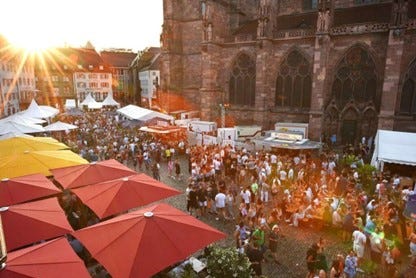
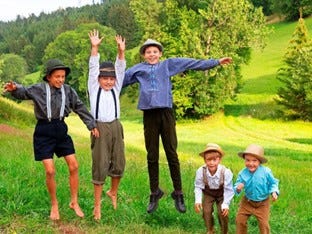

(The sources are: pic 1, pic 2, pic 3 )
Here’s what the pictures are about; we’ll get to the question of what they have in common at the end.
Picture 1: Wine festival in Freiburg, mid-July
The southwestern most stripe of land in Germany, a region called Baden (the western half of the German state Baden-Württenberg), includes no less than nine wine-making sub-regions. They stretch mainly along the River Rhine, from Lake Constance, up to Heidelberg, south of Frankfurt. The largest ones are in the south, around the city of Freiburg.
The Freiburg Wine Festival has a fifty-year tradition and prides itself on tens of thousands of visitors each year. It keeps pace with the times and attracts a young public, too, with offers of wines that are cultivated sustainably.
If there’s a wine festival, there’s a Wine Queen, too. It’s much like a beauty contest, only for expert wine knowledge.
The candidates work for a regional wine-maker and usually have a degree in wine marketing or production. The three contestants first had to give a specialised presentation, such as the advantages of a regional vine sort. Then, they were expected to recognise three different wines presented in three black glasses.
The Wine Queen and the two Wine Princesses opened the Wine Festival in July; they are going to act as wine influencers and ambassadors and promote wine made in Baden for the rest of the year, both in Germany and abroad.
Picture 2: Open air theatre
It's not a party, but it does celebrate something: local stories of significance. This open-air theatre is a tradition established in the 80s: a real story from the southern Black Forest is put on stage by a team of local people, on a volunteer basis.
The community supports their project to ensure the necessary costumes, makeup, haircuts, or props. The 2023 play told the story of a double murder in a nearby village exactly one hundred years before. The performance featured, among other things, a 1927 BMW Dixi, historical motorcycles and authentic clothing and tools.
All eight performances, over 4 weekends, are typically sold out well in advance, despite what might be a rainy summer.
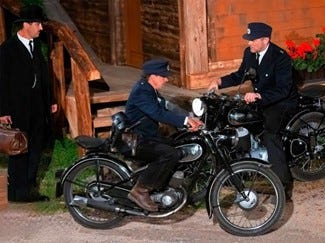
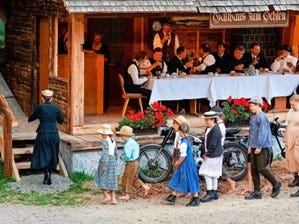
The most remarkable thing about this theatre performance is that it takes place outdoors, with a historical mill farm for a stage set. The same family has owned the "stage set" since 1772.
Far from the madding crowd: 30 minutes away from the nearest parking lot.
No civilisation spoils the illusion of time travel.
Told in the specific regional dialect (Alemannisch), closely related to Swiss German – and nearly impossible to understand for speakers of standard German.
Meteorite hike
This is a celebration of a different kind.
It’s an organised night hike to a fortress ruin perched up on a mountain towering over the surrounding hills, to watch the meteorites on the night of 12-13th August, when meteorite showers reach their peak. The ruin is a local gem, connected with one of the now extinct noble families in Baden back in the 13-14th centuries.
Zoe’s own picture of the same ruin wing, at Burg Hohengeroldseck, on a misty winter morning
Participants meet for the hike at 5.30 pm and set off to the ruins with a professional guide, getting there around 8 pm. The sunset is the first highlight, until just before 9 pm.
Among the group is also a representative of the local Astronomy Club, who presents the night sky, points out constellations, and does the storytelling. A telescope is there, too: you can take a look at Saturn’s rings, for example.
The group starts back around 1 am, either back to the meeting place, through the forest, or to a nearby parking lot, where shuttle vans are available, booked specifically for this event.
Nice, but… so what?
I promised a reflection task at the end.
To me, these three events have nature in common. Nature, and how people engage with it.
The Black Forest is for the most part, a national park. Towns, villages, or settlements are more sparsely scattered than in other parts of Germany, or even Western Europe as a whole. Deep forests, sometimes intentionally established as “Bannwald” (forests left to develop without human intervention), waterfalls, mountain rivers and gorges make up the Black Forest impressive landscape.
And yet, the region is tagged as “Kulturlandschaft”, or “culture landscape”, referring to the harmonious blend of human settlements, agriculture, natural landscape, and use of resources. On a hike through the Black Forest, forests “naturally” alternate with orchards, vines, pastures, and (often) ancient, once fully autarch farms – like the stage set for the open-air theatre I described above.
Living here, and loving it, I can’t help seeing nature as the common point between a wine festival, an open-air theatre showing a local story in its original setting and in the local dialect, and finally, a night hike to watch the year’s peaking meteorite showers.
There’s celebrating a produce (wine), a traditional way of living, and a cosmic cycle.
These three celebrations embody, as I see them, three different levels we tend to engage with nature:
As a resource and workplace at once: thus, we celebrate wine, but also types of cheese, ham, wool, artefacts made of wood, or whatever our natural setting makes it available to us;
Blended with culture and history, as a stage set for our lives, providing for a livelihood and a way of living; thus, we celebrate traditions involving the local river, woods, waterfall, or chronicles of people and their fates in the area;
As a cosmic cycle: thus, we celebrate meteorite showers, Midsummer, the seasonal changes, or the astronomic solstices.
Which level does your community engage with nature most?
Which level feels most familiar, or comfortable, to you personally?
Would a different level of engaging with nature, different than what you currently experience, give you something valuable? This could be, for example,
Grounding, inner peace, recomposure
A source of energy, fuel, regenerative power
· As a resource and workplace at once: thus, we celebrate wine, but also types of cheese, ham, wool, artefacts made of wood, or whatever our natural setting makes it available to us;
· Blended with culture and history, as a stage set for our lives, providing for a livelihood and a way of living; thus, we celebrate traditions involving the local river, woods, waterfall, or chronicles of people and their fates in the area;
· As a cosmic cycle: thus, we celebrate meteorite showers, Midsummer, the seasonal changes, or the astronomic solstices.
… A sense of humbleness; we don’t need to take on the whole world, nor attempt to change laws that are larger than us.
We come and go, and so do our fortunes.
See? I promised a reflection task to do with summer.
Well, mostly.
If you liked this, consider taking a peek at Mentatrix | Zoe Carada | Substack for more on Black Forest, nature, literary fiction, personal stories, reflections on mindfulness – all rounded up with a self-reflection prompt.
Thank you, Zoe, love your guest post and your newsletter! If you would like to subscribe, be a paid supporter, or a guest writer, please contact Wildlands | Robin Motzer
.





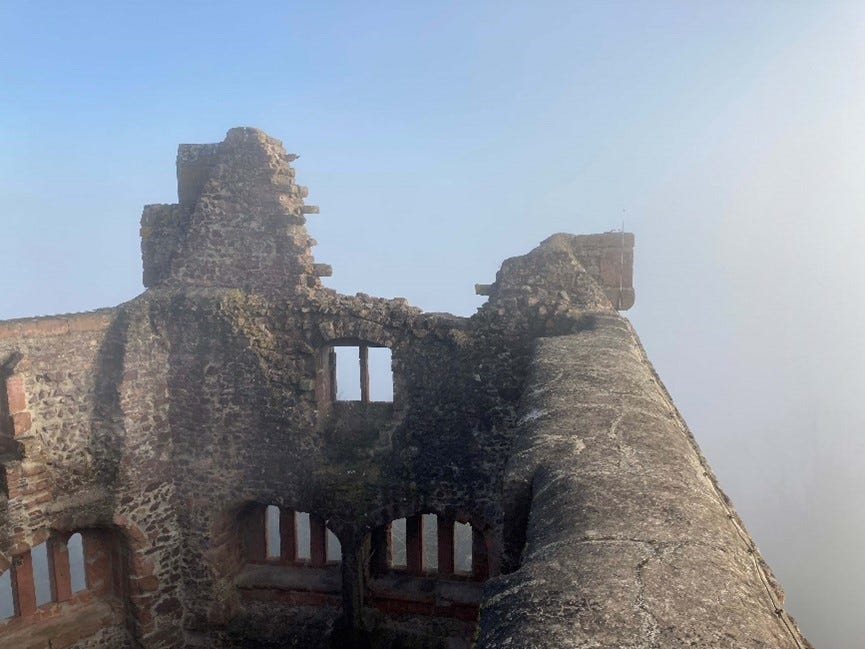



Thank you, Zoe, for a great walk through the summertime festivities in the beautiful Black Forest!
You reminded me of being in Germany and Freiburg in particular, Robin. I fell in love during my short visit. Thank you for sharing with us.